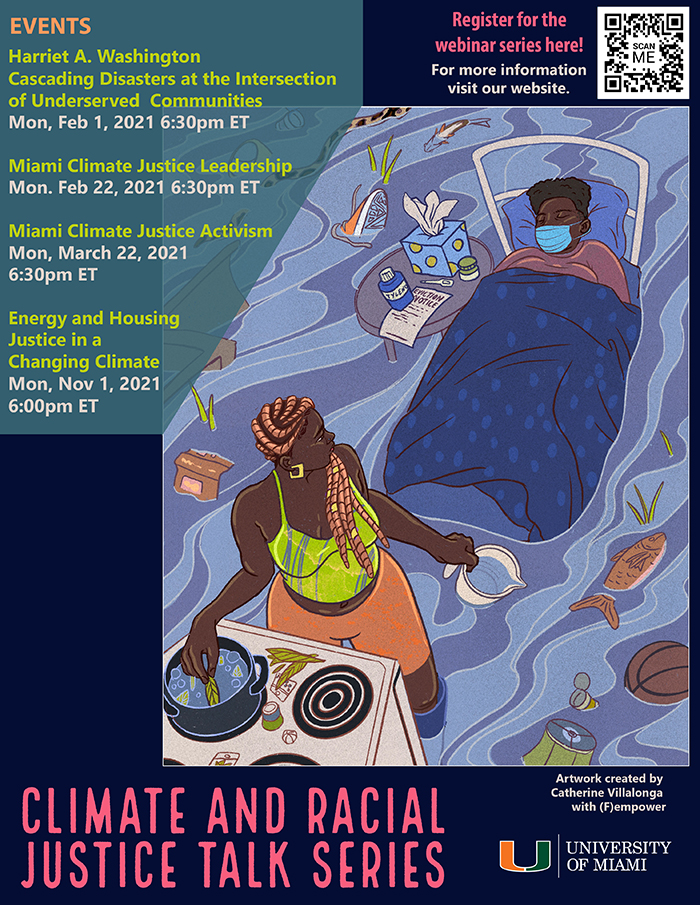(Artwork was created for us by Catherine Villalonga from (F)empower)
A series of presentations and conversations focused on anti-racism and climate justice.
- Harriet A. Washington – Cascading Disasters at the Intersection of Underserved Communities
- Monday, February 1, 2021 6:30-7:30 pm ET
- Miami Climate Justice Leadership
- Miami Climate Justice Activism
- Energy and Housing Justice in a Changing Climate
Climate change adaptation is increasingly occurring in cities and regions around the world. As responses unfold, climate justice is an emerging frontier. Climate impacts often function as a threat multiplier against a backdrop of intersecting drivers of inequality. Just adaptation must recognize the uneven starting points, which include the history of enslavement, colonization, redlining, and marginalization in many forms. The emergence of climate justice builds from a long legacy of work and action, particularly from Black communities, striving towards environmental justice. Climate justice addresses challenges of equity within and across countries, communities, and generations. Policies inherent to climate response are intertwined with questions of their consequences for all people and the processes through which transparency and responsibility of decision-making are ensured. These dialogues aim to provide a needed forum on campus in the current moment and to elevate the voices, experiences, and ideas of BIPOC leaders.
The conversation series included four webinars that explored various aspects of injustices through the lens of climate change:
- The inaugural event for the series will take an in-depth look at climate change and racial injustice, and how they impact underserved communities. The featured speaker, Harriet A. Washington, is an award winning science writer, author of A Terrible Thing to Waste: Environmental Racism and Its Assault on the American Mind.
- Monday, February 1, 2021 6:30-7:30 pm ET
- The second event will feature a discussion focused on the role that institutions play in our community’s journey to address climate and racial injustices. Dwight Bullard, who served as an elected official in the FL House and Senate, and is the current political director of The New Florida Majority, will lead a conversation with Dr. Henri Ford, the dean of the University of Miami Leonard M. Miller School of Medicine; Dr. Cheryl Holder, associate professor at Florida International University Herbert Wertheim College of Medicine.
- The third event in the series will feature leaders from grassroots organizations who are working to support and empower the members of our community, including Mayra Cruz from Catalyst Miami, Santra Denis from The Miami Workers Center, and Valencia Gunder from Make the Homeless Smile and New Florida Majority.
- The final webinar event in the dialogue series will explore the the interconnections between energy and racial justice. We’ll explore topics such as a just transition and the energy, built environment, and housing nexus. Coming together in conversation are Denise Abdul-Rahman, Field Organizer for the NAACP Environmental Climate Justice Program; Sanya Carley, energy economics and policy professor at Indiana University; and Khalil Shahyd, Senior Policy advisor on equity, environment, and just communities at the Natural Resources Defense Council (NRDC). This event will be recorded.
This is a University of Miami Laboratory for Integrative Knowledge (U-LINK) sponsored project.
The series was created by:
- Scot Evans (School of Education and Human Development)
- Margo (Mars) Fernandez-Burgos (Department of Educational and Psychological Studies PhD program in counseling psychology)
- Abigail Fleming (Environmental Justice Clinic, School of Law)
- Armen Henderson (Miller School of Medicine)
- Katharine Mach (Rosenstiel School of Marine and Atmospheric Science)
- Jennifer Niemann (Rosenstiel School of Marine and Atmospheric Science)
- Lynée Turek-Hankins (Abess PhD program in environmental science and policy)
If you have questions regarding this seminar series, please contact us.




